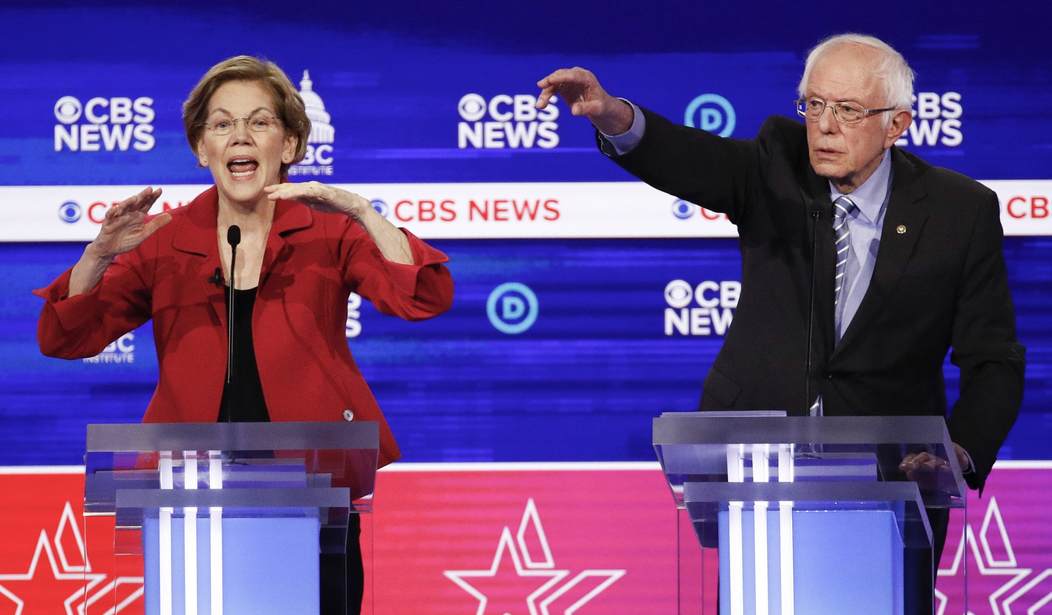During a Fox News town hall event on Thursday, President Donald Trump said he had prepared to face Sen. Bernie Sanders (S-USSR) in November but Super Tuesday changed that when former Vice President Joe Biden cleaned up, winning Alabama, Arkansas, Maine, Massachusetts, Minnesota, North Carolina, Oklahoma, Tennessee, Texas, and Virginia. Trump blamed Sen. Elizabeth Warren (D-Lost Her Own State) for costing Sanders many Super Tuesday states.
“I think about Maine, Maine was almost a tie,” Trump said. “They had to wait a day and a half before they could even call it, it was so close. [Warren] — I guess — came in third, and it was a very distant third, but she got a lot of votes. Maine would have gone to Bernie. I think he would have gotten everything, right?”
“Bernie Sanders would have won 5, 6, 7 states. He would have won Minnesota, he would have won at least another 2 or 3 states. So when you look at it, she did him no favors, that was not a good friendship,” the president quipped.
“If she just dropped out of the race [even] without an endorsement, he would have won a tremendous number of states,” Trump suggested.
“I’m all set for Bernie, ‘Communist!’ I had everything down,” he added. “And then we have this crazy thing that happened, right? On Tuesday, which [Biden] thought was Thursday. But he also said 150 million people were killed with guns and he was running for the United States Senate. ‘Support me, I’m running for the United States Senate!'”
President Trump asked who he would rather face, Joe Biden or Bernie:
“I was all set for Bernie… Communist, I had everything down”
Then blasts Biden’s gaffes over the past week. pic.twitter.com/Ez5YcGdQKo
— ALX 🇺🇸 (@alx) March 6, 2020
Trump’s suggestion about Warren costing Sanders states seems plausible. After all, Sanders and Warren agreed on the central division in the Democratic field — health care and Medicare for All. Warren’s policy platform echoed Bernie’s, even though she hedged in order to make the numbers slightly less bad. It stands to reason that Warren supporters are more likely to agree with Sanders on policy, so more of them might flock to Bernie over Biden now that Warren has withdrawn.
As the president said, Maine was close: Biden won with 34 percent to Bernie’s 32.66 percent, while Warren took third with nearly 16 percent. Texas was also close, with Biden taking 34 percent to Sanders’ 30 percent, and Warren taking 11 percent. In Massachusetts, Biden took 33.5 percent to Bernie’s 27 percent, with Warren at 22 percent. Assuming more Warren voters flock to Bernie over Biden, it is feasible that Bernie would have won Maine, Texas, and Massachusetts.
The Massachusetts senator would have been less likely to flip the race to Bernie in other states, however. In Minnesota, Biden took 38.6 percent to Bernie’s 30 percent, with Warren at 15 percent. If the vast majority of Warren voters would have flocked to Sanders, he could have pulled that one off, but an 8-point swing is less feasible. In Oklahoma, Bernie would have needed almost every single Warren voter — Biden got 38.67 percent to Bernie’s 25.43 percent, with Warren at 13.38 percent.
In every other state Biden won, the former VP led Sanders by more than Warren’s vote total. Biden actually won a majority in Alabama (63 percent) and Virginia (53 percent).
Of course, Bernie still had a fairly good night. He won California, Colorado, and Utah — and he won Vermont with a majority (50.7 percent). But the major story from Super Tuesday was the Joe Biden comeback.
Had Warren dropped out before Super Tuesday, Biden likely would have won Maine, Texas, and Massachusetts, and it is feasible but less likely he would have won Minnesota. With those four states, he would have won eight states to Biden’s six, and would likely hold the delegate lead.
Naturally, there are more factors to consider. Bloomberg dropped out and endorsed Biden, so backers of the former VP could insist that Bloomberg’s voters count for Biden, in which case Warren didn’t really spoil much of anything for Bernie.
Politics is rarely as clear-cut as this analysis suggests, of course. Many of the people who supported Warren could not bring themselves to support Bernie. Some wanted the first woman president and some liked her style (I know, confusing, right?). Similarly, many Bloomberg voters will not just fall in line with Biden. It remains unclear exactly why former Mayor Pete Buttigieg and Sen. Amy Klobuchar (D-Minn.) dropped out of the race and endorsed Biden right before Super Tuesday — although some establishment machinations were almost certainly involved. Klobuchar may have known from internal polls that she was unlikely to win her home state. If so, the question remains whether Warren knew — and why she decided to stay in the race anyway, if she knew.
Trump is likely right that if Warren had dropped out, Bernie would have had a much better night. Now, however, it is a two-man race — and President Donald Trump is younger than both of them.
Tyler O’Neil is the author of Making Hate Pay: The Corruption of the Southern Poverty Law Center. Follow him on Twitter at @Tyler2ONeil.









Join the conversation as a VIP Member